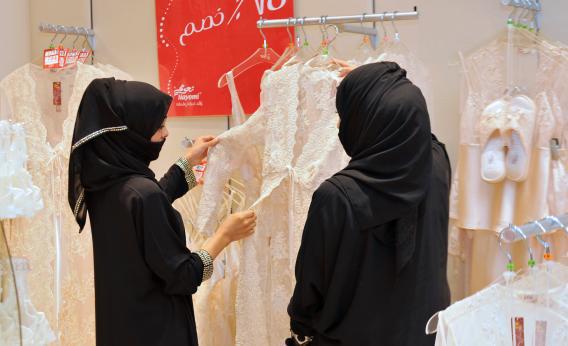This month, Saudi Arabia begins enforcing a law that requires lingerie stores to be staffed by women. Previously, women buying lingerie had to deal with male clerks, which many found humiliating. Reportedly, one reason for the new decree was a two-year Facebook campaign called “Enough Embarrassment.”
The change has been heralded by many. It will not only allow shopping women to avoid awkward encounters at the store; it will also create jobs. One Saudi women’s rights advocate, Reem Assad, told NPR that the decree might create 20,000 jobs for women, while the BBC puts the number at double that.
A slightly different look at the change is evident in the 2010 mystery novel City of Veils, by Zoe Ferraris. Ferraris lived in Saudi Arabia with her then-husband, a Palestinian Bedouin, after the first Gulf War and has written two excellent mystery novels about crime, gender roles, and religion in the kingdom—Finding Nouf and its sequel City of Veils, both of which follow, among other characters, a female forensic technician in the coroner’s office of Jeddah. In City of Veils, a lingerie store serves as a pivotal location. In the following passage, two of Ferraris’ investigators visit a lingerie store to search for clues in the murder of a privileged woman who has been working on a controversial documentary. The victim’s brother owns the shop:
A lingerie store was strange, tricky territory. He’d brought Faiza on the off chance that this would be one of the 250-odd lingerie boutiques in Jeddah that had actually managed to comply with the Labor Ministry’s new edict enforcing the hiring of women. “Encouraging more women in the workplace,” they’d called it, but it was really a bid to clamp down on one of the few places where men had access to women, where women could confer with men in whispers about their panty preferences and cup sizes and which of the dazzling varieties of erotic “looks” they preferred in the bedroom.
The religious establishment had been securitizing and pressuring the industry for years, but until recently store owners had always managed a successful defense, arguing that they couldn’t hire women because most of their customers were actually men shopping for their wives. Since women had a more difficult time getting out of the house, they sent their husbands to buy for them—hence the need for male clerks. When the Labor Ministry issued its new law—only women should work in lingerie stores—the religious establishment roared. The idea of male employees handling brassieres and thongs sent the imams into a lather, but apparently the threat of women leaving off child-raising and cooking to find outside work was even more depraved.
In fact, the law banning men from working in lingerie stores (as well as store selling other women’s clothes, plus cosmetics) was first passed in 2005, but wasn’t enforced until now; that’s likely what Ferraris was referring to in the above. Admittedly, she is neither Muslim nor Saudi, but her reading of the change—that it is not 100 percent positive, in that it removes one of the few opportunities for women and men to interact—nevertheless adds an interesting layer to the celebration.
Ferraris discussed Saudi clerics’ confusion over lingerie stores in a December 2010 interview with the Israeli newspaper Haaretz, saying that before she started writing City of Veils,
I read all these articles in the Arab News about changes going on in Saudi because the clerics didn’t like men staffing lingerie stores. Women come in to discuss panty styles and bra sizes with a bunch of strange men. But the clerics were in a pickle, because they didn’t want women working outside their homes. Yet lingerie is a huge business. So what are you supposed to do about lingerie stores? I remember, when I lived there, my sisters-in-law would visit a store and return home with a big bag filled with lingerie that they were going to try on.
Ferraris’ next installment in the series, Kingdom of Strangers, will be released this summer. I hope that the new novel tackles Saudi King Abdullah’s (almost entirely symbolic) decision to allow women to vote in municipal elections beginning in 2015.
